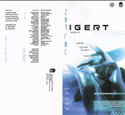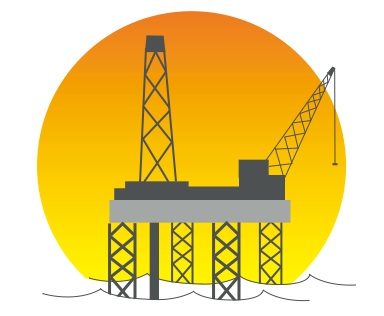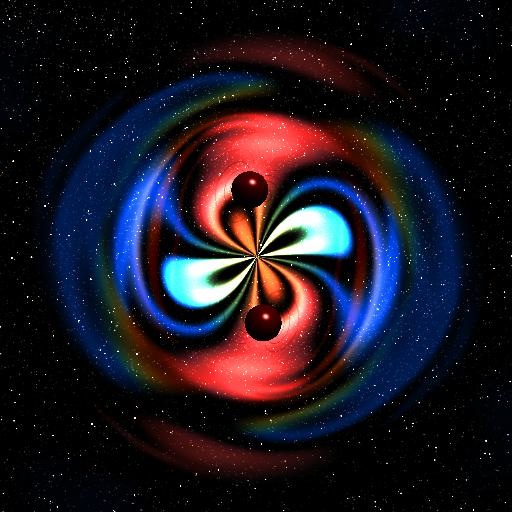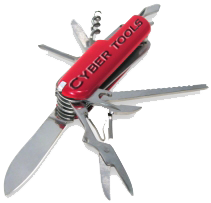Latest News
All-hands Meeting
The NSF EPSCoR RII Symposium took place on Monday, May 11, 2009 in Baton Rouge, Louisiana. The symposium featured four 'anchor' presentations on CyberTools/Science Driver interactions, a poster competition, an outreach/education session, and plenty of opportunities for networking. Find the Symposium's presentations and posters here.
[Other News]
CyberTools Projects
CyberTools will include services and tools for data-sharing, on-demand computing and dynamic scheduling, dynamic data-driven application systems, metadata catalogues and decision systems as well as portals, visualization tools and application toolkit. Initial applications driving CyberTools come from bioinformatics, computational fluid dynamics and molecular dynamics.
AlpacaCactus Tools for Application Level Performance and Correctness Analysis. The Alpaca project is developing complex, collaborative scientific applications, appropriate for highly scalable hardware architectures, providing fault tolerance, advanced debugging, and transparency against new developments in communication, programming, and execution models. Such tools are especially rare at the application level, where they are most critically needed. Alpaca is funded under the NSF SDCI program. |
|

|
Blue WatersSustained Petascale Computing. The Blue Waters project will provide a computational system capable of sustained petaflop performance on a range of science and engineering applications. The project also includes intense support for application development and system software development, interactions with business and industry, and educational programs. This comprehensive approach will ensure that users across the country will be able to use Blue Waters to its fullest potential. |

|
CFD IGERTNational Science Foundation (NSF) Integrative Graduate Education and Research Traineeship (IGERT) Program: Multi-Scale Computational Fluid Dynamics (CFD): A unique interdisciplinary program integrating research and education in engineering, basic sciences, arts and sciences, and coastal sciences at Louisiana State University, Baton Rouge with outreach partners at LSU Medical School, Southern University, and Louisiana Tech University. |
LONILouisiana Optical Network Initiative. LONI is a state-of-the-art, fiber optics network that runs throughout Louisiana, and connects Louisiana and Mississippi research universities to one another as well as National LambdaRail and Internet2. LONI provides Louisiana researchers with one of the most advanced optical networks in the country and the most powerful distributed supercomputer resources available to any academic community with over 85 teraflops of computational capacity. |
|

|
PetaShareA Distributed Data Archival, Analysis and Visualization Cyberinfrastructure for Data-intensive Collaborative Research. PetaShare will enable transparent handling of underlying data sharing, archival, and retrieval mechanisms; and will make data available to the scientists for analysis and visualization on demand. PetaShare will respond to an urgent need of scientists who are working with large data generation, sharing and collaboration requirements. In CyberTools PetaShare is being used to provide collaborative, large scale, distributed storage for most of the application teams, where ongoing activities are developing community archives and metadata systems. |

|
SAGASimple API for Grid Applications. SAGA provides an application-level programming abstraction for distributed environments. It provides a simple and consistent programmatic interface to the most commonly required Grid functionality. SAGA is a soon to become OGF technical specification thus ensuring that it is stable, widely adopted and available. In CyberTools SAGA is being used to develop application manager tools in different areas, and is being integrated with the Cactus framework to enable different distributed application scenarios. |

|
SCOOPSURA Coastal Ocean Observing and Prediction. The SCOOP program is integrating diverse efforts and empowering a virtual community of scientists with the tools, resources, and ideas that lead to discovery. The purpose is to promote the effective and rapid fusion of observed oceanographic data with numerical models and to facilitate the rapid dissemination of information to operational, scientific, and public or private users. |

|
UCoMsUbiquitous Computing and Monitoring System for discovery and management of energy resources. The DOE funded UCoMS project joins three Louisiana Universities: University of Louisiana at Lafayette (UL Lafayette), Louisiana State University (LSU), and Southern University (SUBR), in research and development to provide innovative computational and information technology solutions to advance energy-related area. UCoMS has built a Black Oil Toolkit for reservoir simulation using the Cactus Framework, and is providing workflow solutions for deploying the many simulations needed for sensitivity studies, reservoir design, etc. |

|
XiRelNext Generation Infrastructure for Numerical Relativity. XiRel is developing a highly scalable, efficient and accurate adaptive mesh refinement layer for the Cactus Framework, based on the Carpet driver, and optimized and supported for numerical relativitists studying the physics of black holes, neutron stars and gravitational waves. New tools will be distributed as part of a freely available Einstein Toolkit providing an open code for black hole simulations and incorporating mechanisms to encourage code sharing, verification, and validation. |
